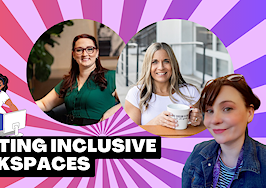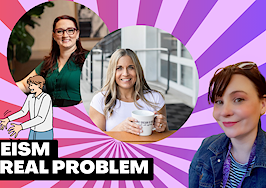In these times, double down — on your skills, on your knowledge, on you. Join us Aug. 8-10 at Inman Connect Las Vegas to lean into the shift and learn from the best. Get your ticket now for the best price.
National disability independence day is celebrated each year on July 26. This date commemorates the signing of the Americans with Disability Act (A.D.A.) in 1990. Kicking off a new series called Service Skills, we will tackle common barriers that disabled individuals face trying to find housing that they can modify or build for their specific needs.
These topics will cover workplace practices, consumer issues, and specific housing challenges that agents need to know about. In part three of the series, today’s video will cover workplace-specific problem areas. (Here you can find parts one and two of the series.)
We are focused on building skills for today, tomorrow and creating agents of change. An estimated 26 percent of Americans have a disability recognized under the ADA, meaning that potentially one in four of your customers face some mental or physical barrier when navigating life.
As the housing industry moves forward in the future, there are many discussions about disrupting the norm. Our service team is dedicated to helping ensure that you have the tools you need to be innovative and provide the best service possible for agents and consumers.
Our experts
In this fantastic interview series, I connected with two amazing women who are making change in our industry in a big way. First and closest to our crew here at Inman, we have the pleasure of working with Dani Vanderboegh, a long-standing senior editor.
In addition to her duties as senior editor, Dani and her team produce niche newsletters for first-year agents, veteran agents, brokers and teams, and writes Inman’s Real Tea column, where real estate and reality TV intersect.
Since earning her master’s degree in magazine editing from the University of Missouri School of Journalism in December 2014, she has happily been part of the team at Inman, collaborating with industry-leading professionals, working with top real estate journalists, and speaking at industry events nationwide including WomanUp.
Living in a semi-rural suburb of St. Louis with her husband and daughter, she explores her passions for gardening, reading and writing, nerding out over all things pop culture, exploring new gastronomic frontiers, and sharing her life as a wheelchair user in hopes of creating awareness.
Second, we were joined by Alycia Anderson of The Alycia Anderson Company. Anderson is an international speaker and advocate for Diversity, Equity and Inclusion training.
A celebrated TEDx speaker and advocate, Anderson is a vibrant and brilliant woman who has created more education around Disabling Ableism. Anderson is a wealth of knowledge and personal experiences to help businesses train better employees and offer more inclusive experiences for consumers.
Anderson also recently launched a new podcast called Pushing forward with Alycia, where she gives disability a voice, challenges stereotypes, and promotes inclusivity.
Fast facts about housing and affordability
- Just 6 percent of homes in the U.S. are accessible for those with mobility-related disabilities, according to a 2020 Apartment List study.
- According to the Urban Institute, households with at least one disabled member earn less than 60 percent of what households with no disabled members earn.
- U.S. housing stock is not well equipped to accommodate people with disabilities. This need will likely become more acute as the number of older Americans with both ambulatory limitations and a desire to age in place grows.
- In 2019, 21.6 percent of disabled people were considered poor under the census’ Supplemental Poverty Measure, compared with just over 10 percent of people without disabilities.
- Nearly a third (29.6 percent, 3.5 million) of the 12 million veterans ages 21 to 64 report having a disability
- 67 percent of people feel uncomfortable when talking to a disabled person. This awkwardness often comes from ignorance, fear or patronizing past experiences.
Communities and barriers for those with disabilities
- Physical: Buildings, sidewalks and restrooms are not accessible.
- Policy: Limited enforcement of the policy to provide accessible tools for this group
- Programmatic: Poor planning, schedules that do not allow for extra time, and equipment that is not designed for the disabled to use
- Social: Education and employment instability, low income, lack of access to good health care, vulnerability to violence
- Transportation: Mass transit systems are not friendly; reliable and affordable transportation is in short supply.
Things you can do to be prepared
- Make sure your company’s website is ADA-compliant
- Be aware of what measurements are ADA-compliant
- Incorporate digital and physical calendar reminders and management
- Have physical and digital options for forms and educational material
- Invest in mobile ramps for customers for open houses to improve accessibility
- Always offer a virtual tour option for your listings
- Create relationships with contractors who are familiar with these modifications
- Start asking your clients if they need any special accommodations for showings or specific musts for housing. Make this a normal practice. Many disabilities are invisible.
- Don’t be awkward and don’t be overly invasive. Be authentic, and your customers will appreciate it.
Although “people with disabilities” sometimes refers to a single population, this is actually a diverse group of people with a wide range of needs. Two people with the same type of disability can be affected in very different ways. Some disabilities may be hidden or not easy to see. – Centers for Disease Control
Wrapping up
When we think of sales, it seems that the focus is on building the relationship, but what do you do if the systems that you use to help your clients create friction and chaos?
The Fair Housing Act (FHA) and the Americans with Disabilities Act (ADA) are in place to ensure individuals with disabilities have equal access to home-buying opportunities. While these laws are in place, it takes much more than guidelines to improve experiences for the disabled in our country.
It’s more than just an accessibility crisis; we also have deficient skill sets for social and emotional interactions. What takeaways do you have from this series? We want to hear your feedback about how you and your team plans to implement these new skills.
Rachael Hite is a former agent, a business development specialist, fair housing advocate, copy editor, and is currently perfecting her long game selling homes in a retirement community in Northern Virginia. You can connect with her about life, marketing, and business on Instagram













